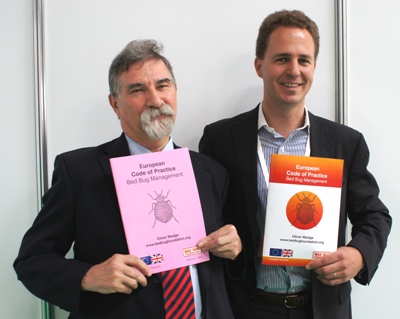The new European Code of Practice for bedbug management was launched at the ConExPest/Europest event in Krakow in May. The production of the new code has been co-ordinated by the Bed Bug Foundation.
The document is based on the pioneering Australian code already in its third edition and included input from leading bedbug experts, as well as a formal consultation process within the European pest management industry.
|
Unfortunately the chairman of the Bed Bug Foundation, Oliver Madge who was expected to present the code, did not make an appearance. Fortunately Dr Daniel Bajomi from Babolna Bio and Frederic Verwilghen from Edialux, stepped in and gave an excellent double-act on the content. Dr Bajomi was one of the instigators of the Bed Bug Foundation, whilst Frederic is also a vice president of the European confederation of pest control associations, CEPA. Both presenters it turned out have firsthand experience of bedbugs. Frederic’s encounter was on an aeroplane and Daniel’s in a hotel bedroom – the airline and hotel chain concerned must remain nameless! |
|
|
Bedbug infestations were thought to be a pest of the past but recent years have seen a resurgence. For example there was a 26% increase year-on-year in London over the five year period 2002 to 2007, whilst between 1999 and 2006 Australia experienced a massive 500% increase in bedbug problems. North America is also experiencing an explosion of cases. The reasons for the surge are generally accepted to be:
Bedbugs are a pest which potentially threatens everyone. “It’s an exposure pest not a dirty pest, explained Frederic. ” And, one thing’s for sure. If you haven’t got bedbugs in your country yet the chances are you will have them soon.” Bedbugs are a global pest requiring a global solution so this pan-European code is to be welcomed as a step in the right direction. The code provides a wealth of information on bedbugs and their detection and control. It advocates the need for pest controllers to switch from thinking solely about controlling the pest to ways in which they can manage it through monitoring and periodic assessments. Pest professional are a key audience but so too is the accommodation industry; hoteliers, bed & breakfast owners and those involved in social housing all need to have a better understanding of the problem. Simply waiting for a complaint is no way to tackle it. Nor will closing a room for seven to ten days make any difference as anyone who knows anything about the biology of bedbugs will testify, they can go several weeks without a feed. Spraying irrespective of population levels however cannot be recommended either as this will simply accelerate the development of resistance. What is required is an integrated pest management (IPM) strategy. In simple terms the three step approach to the control of bedbugs advocated in the code is:
Click here to download your copy of the new Code of Practice and make a note of the website as the intention is to review the code periodically and to publish updated versions as necessary on the website.
|
|



 Launching the new Code of practice in Poland are Dr Daniel Bajomi,
Launching the new Code of practice in Poland are Dr Daniel Bajomi,